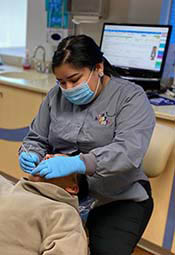If you’ve lost a few teeth because of decay or trauma, your dentist may recommend partial dentures to restore your smile. Partial dentures, which are sometimes referred to as false or artificial teeth, offer a number of benefits. They can help patients who have lost teeth chew and speak normally again. Filling in the gaps created by missing teeth also prevents the face from sagging. Properly fitting artificial teeth from MyOrthodontist in Chapel Hill, NC are easy for the patient to maintain and generally do not require the use of an adhesive.
What Are Partial Dentures?
A partial denture is a removable device for patients who are missing one or several teeth. It is different than a full denture, which is designed for patients who have lost all of their teeth. With a partial denture, the artificial teeth are attached to a gum-colored plastic base and are held in place by a metal framework and clips on the adjacent teeth. This device is custom-made in our laboratory from impressions we take of your mouth, ensuring a comfortable and secure fit. Patients who wear this type of device regain a full smile and are even able to eat while wearing the artificial teeth.
Why Should I Consider Artificial Teeth?
In addition to the cosmetic benefit of having a full smile, replacing missing teeth is important for the overall health of your jawbone and face. When a tooth is missing, the neighboring teeth begin to shift, placing additional stress on the remaining teeth and the jaw and sometimes affecting the bite. Properly chewing food is also more difficult when teeth are missing, which can lead to digestion issues. In addition, there are cosmetic issues associated with missing teeth that go beyond the look of your smile.
Having a full set of teeth provides the structure for the chin and lips, which can sag inward when teeth are missing. The loss of teeth can also affect the sinus cavity, which sits just above the upper teeth. When you go for a period of time with missing teeth, your jawbone will begin to shrink and weaken. Even a slight decrease in the size of the jawbone can create problems with the sinus cavity.
How Often Should I Take This Type of Denture Out?
Most patients remove their dentures once a day for cleaning. You may also want to remove the dentures while sleeping. We’ll provide you with specific instructions regarding when to wear and remove the dentures. When you’re putting the device in your mouth, be sure to secure it in place with your fingers rather than by biting down on it. Biting the artificial tooth device into place can damage it and stress its metal framework.
How Hard Is It for Patients to Adjust to This Device?
As with anything new, there is a short adjustment period. It may take a couple of days to get the hang of inserting and removing your dentures. It also takes some patients a few days to get used to the feeling of having an appliance in their mouth. But most patients make the adjustment in no time, and before long they don’t want to go without the device.
How Should I Clean This Device?
Keeping your dentures clean is important because it ensures that they stay comfortable and easy to use. When bacteria and food collect on dentures, the appliance can start to irritate the gums. When we outfit you with this appliance, we’ll go over the cleaning instructions with you. Most patients brush their dentures regularly with either a denture brush or a toothbrush that has soft bristles. It’s also important to keep up with regular brushing and flossing of your permanent teeth, which will keep bacteria levels in your mouth under control.
What Is a Denture Adhesive?
Adhesives are sometimes applied to the underside of dentures to ensure that the appliance stays securely in place. Dental adhesives come in the form of pastes, powders, or adhesive pads. Some adhesives contain zinc, which enhances adhesion.
Will I Need to Use an Adhesive?
Properly fitted dentures generally do not require the use of an adhesive. Some patients prefer the extra security that a small amount of adhesive offers, but the use of adhesives is usually not necessary. It’s true that dentures can gradually become loose over time as the bone structure in the mouth shrinks. When this occurs, we can realign your device or create a new one that better fits your mouth. If you’ve noticed a change in the way your device fits in your mouth, the best thing to do is to schedule an appointment with our practice so we can work with you to resolve the issue.
If I Do Use an Adhesive, How Much Should I Use?
Patients who use adhesives apply and remove them daily. When using an adhesive, always follow the directions on the package.
Can I Eat While Wearing False Teeth?
Most patients are able to eat their favorite foods while wearing false teeth. In fact, one of the great things about false teeth is that they actually make it easier to chew, improving digestion. You’ll want to start off slowly and give yourself time to adjust to wearing artificial teeth. Most patients start by eating soft foods cut into bite-sized pieces.
Cereal, yogurt, and pasta are great foods to start off with. As you become more comfortable with the device, you’ll be ready to proceed to sturdier foods and meats. Be sure to chew on both sides of your mouth with even pressure, which will minimize wear and tear on your device.
What Benefits Are Associated With Partial Dentures?
There are a number of benefits associated with artificial teeth, including improved speech, more self-confidence, and better oral health.
Improved Speech
Patients who have been without teeth for an extended period of time often find that their ability to pronounce certain words improves once they start wearing this type of denture. That’s because the teeth, along with the tongue and lips, help control airflow in the mouth, which influences how we speak.
Long-Term Flexibility
If you do end up losing more teeth down the road, we can adjust this type of denture to incorporate additional false teeth. We can also adjust the appliance to accommodate any bone shrinkage in your jaw, ensuring that this device will remain comfortable and secure for you for years to come.
Comfort
The process of getting partial dentures is easy and comfortable for the patient. We’ll take measurements and create an impression of your mouth with the aim of giving you a device that fits precisely and comfortably. After you’ve worn the device for a period of time, we can make adjustments to improve fit and comfort.
Improved Self Confidence
Most patients–particularly those who have been without teeth for a while–report an immediate boost in their self-confidence once they start wearing this type of denture. They are able to smile confidently again and no longer want to hide their teeth. This type of denture also adds structure to the lower face and prevents it from sagging inward.
Better Oral Health
Having a full set of teeth in place, whether real or artificial, can improve your long-term oral health and boost the effectiveness of regular brushing and flossing. When teeth are missing, the remaining teeth tend to drift, trapping food particles in the mouth and allowing bacteria to build up. When this happens, the gums are left vulnerable to disease and inflammation. Having a full set of teeth that are in place and in line also makes it easier for patients to keep up with their oral hygiene habits.
Simple Adjustment
There is a short adjustment period when a patient begins to wear this type of device, but most patients adapt quickly and appreciate the benefits of having a full set of teeth. You’ll be surprised at how good it feels to smile.
What Other Options Do I Have for Replacing Missing Teeth?
Dental implants can also be used to replace one or several missing teeth. Implants, which are growing in popularity, are long-term tooth replacements that are surgically placed in the jawbone and held in place with a titanium post. They are a safe and permanent way to replace teeth that are badly damaged or already missing. Once in place, an implant looks and acts like a normal, natural tooth.
Why Choose Our Practice?
Are you curious about the various options you have for replacing missing teeth? Our practice offers free smile assessments where we review your oral needs and health and help you make the choice that is right for you, your budget and your lifestyle. We combine friendly, personalized care with the modern amenities of a high-tech orthodontics and dentistry practice. We also offer a variety of insurance and financing options. Call MyOrthodontist in Chapel Hill, NC and ask about partial dentures.


